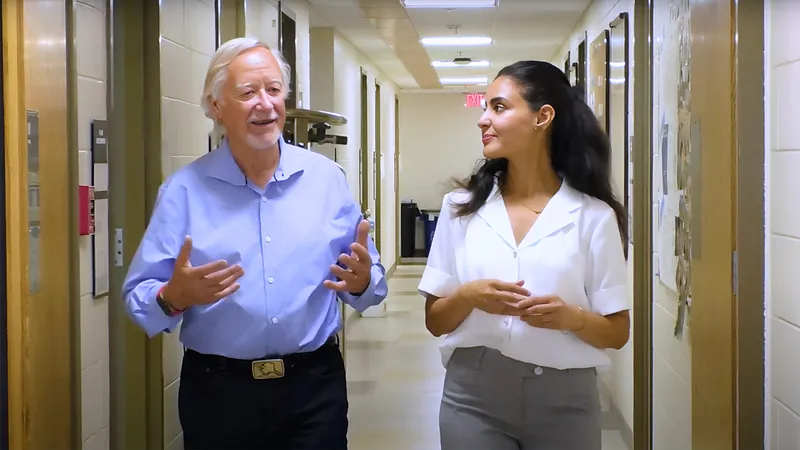
Meet the Inspiring Single Mom Scientist Breaking Barriers in the World of Telomere Research
2024-12-17
Author: Mei
Introduction
Taghreed Mohammed Al-Turki's journey is nothing short of remarkable. Hailing from Saudi Arabia, she was immersed in a family of scientists, with her older siblings excelling as physicists and chemists. "Science is part of my genome; it’s in my blood," Al-Turki reflects, recalling her school days filled with curiosity and enthusiasm for scientific exploration—and her eagerness to spend time in the lab analyzing different slides under a microscope.
Academic Path and Research
Her academic path began with a bachelor's degree from the University of Tabuk, followed by a master’s from King Saud University. Determined to take her research further, Al-Turki moved to the United States to pursue a doctoral program in cell and molecular biology at Colorado State University. Under the microscope's lens, she investigated telomeres—critical structures that protect chromosomes—and joined a significant NASA study assessing how radiation exposure in space affects these biological caps.
Personal Struggles
While diving into her passion for science, Al-Turki faced personal struggles, including a challenging divorce and the responsibilities of raising her infant son, Ibrahim, who was only two months old as she embarked on her academic journey. "It was a challenging time," she admits, but the joy and fulfillment she felt in the lab served as a balm against her worries about motherhood and the upheaval in her personal life.
Postdoctoral Opportunities and COVID-19 Challenges
In 2019, Al-Turki earned her Ph.D. and embarked on a quest to find postdoctoral opportunities in telomere research. Serendipitously, she discovered an opening at the lab of Jack Griffith, a distinguished professor at UNC-Chapel Hill, whose groundbreaking work she had admired during her undergraduate years back in Saudi Arabia.
However, upon moving to North Carolina, fortune turned fickle as the COVID-19 pandemic wreaked havoc worldwide. The lab became an eerily quiet place where Al-Turki, alongside Griffith, was faced with the daunting task of conducting experiments amidst unprecedented challenges. She worked tirelessly, reassessing tests and adjusting protocols, all while balancing motherhood and research in isolation.
Breakthrough in Telomere Research
Fast forward to 2023, and Al-Turki achieved a pivotal breakthrough in telomere research—the first major finding in decades. She demonstrated that telomeres can produce two small proteins, one of which is elevated in certain cancer cells and in patients with telomere-related diseases. Her monumental research was published in the renowned Proceedings of the National Academy of Sciences, solidifying her place in the scientific community.
Reflections and Support
Now, as Ibrahim flourishes at 11 years old, Al-Turki reflects on her journey filled with hurdles and support. “We need to change the narrative around women in science,” she urges. “We can balance both careers and motherhood, but we need the right support systems in place.” Her mentor, Griffith, played an invaluable role in her success—not just through research guidance but also with personal gestures like spending time with her son and assisting with travel to scientific conferences.
Mentorship and Success
Griffith underscores Al-Turki's struggle, stating, “A career in science is hard. And it’s even harder as a single mother. At this stage, accolades don't matter to me; helping Taghreed achieve recognition is what’s truly important.”
Conclusion
Al-Turki's story is a testament to resilience, passion, and the synergy of ambition and motherhood. As she continues to forge a path in the scientific landscape, her work is paving the way for future generations of women in science, reminding us all that with determination and support, anything is possible.



 Brasil (PT)
Brasil (PT)
 Canada (EN)
Canada (EN)
 Chile (ES)
Chile (ES)
 España (ES)
España (ES)
 France (FR)
France (FR)
 Hong Kong (EN)
Hong Kong (EN)
 Italia (IT)
Italia (IT)
 日本 (JA)
日本 (JA)
 Magyarország (HU)
Magyarország (HU)
 Norge (NO)
Norge (NO)
 Polska (PL)
Polska (PL)
 Schweiz (DE)
Schweiz (DE)
 Singapore (EN)
Singapore (EN)
 Sverige (SV)
Sverige (SV)
 Suomi (FI)
Suomi (FI)
 Türkiye (TR)
Türkiye (TR)